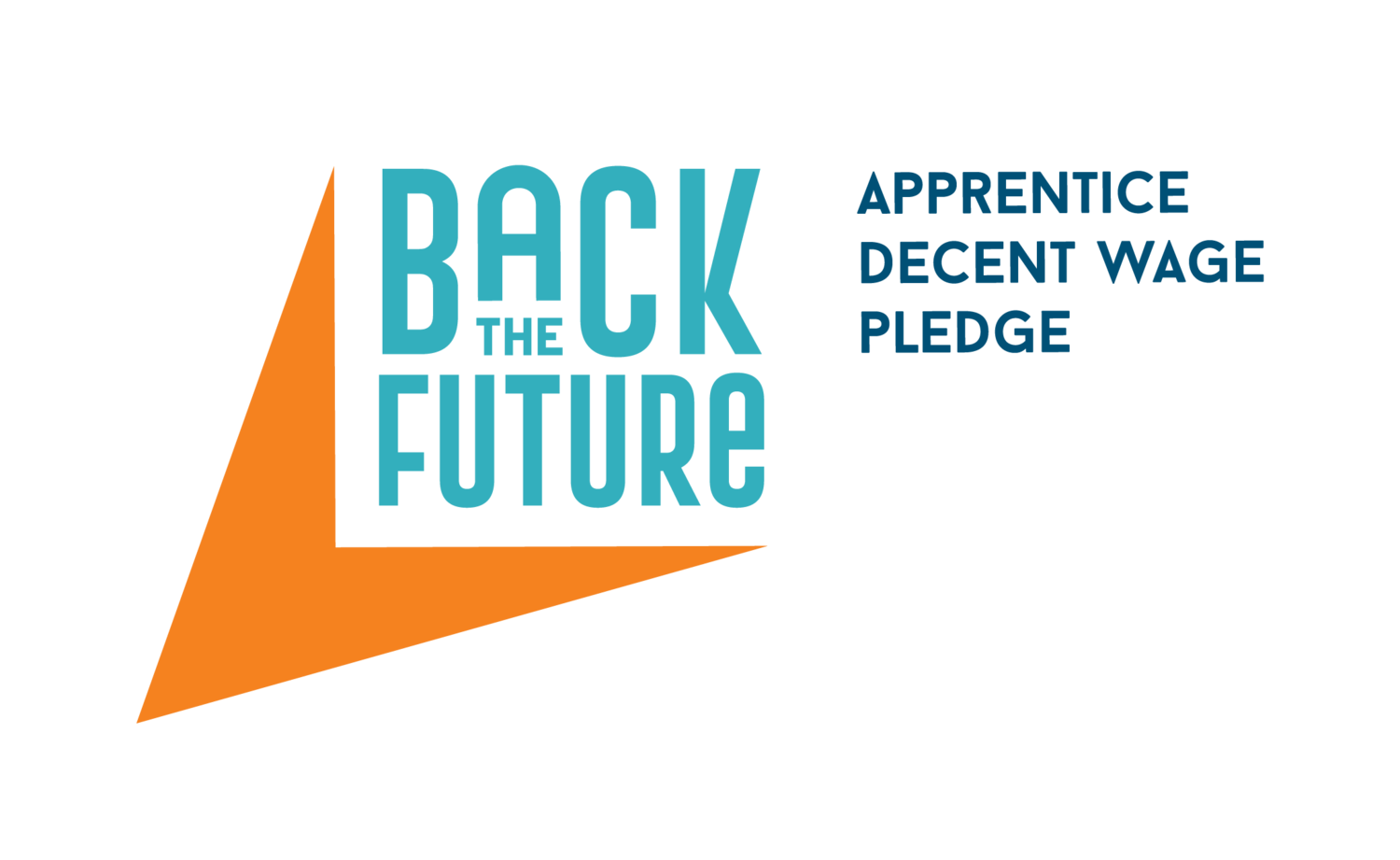
Case Study:
Future Apprentice Perspective

Mid-career career changes - Why the Apprentice Decent Wage Pledge not only matters, but is necessary.
On the Apprentice Decent Wage Pledge we talk a lot about what employers are doing to Back the Future, but it’s also important to understand both the humans that benefit from thoseemployers doing so & the real life benefits of deciding to Back the Future.
There’s never been more open conversations about culture, process and authenticity than there is right now and yet there are still many companies that take the easiest, most budget-friendly route to get a solution implemented when they’re looking for quality, results oriented outputs in return.
This approach can not only be damaging for the long-term reputation and revenue of the business, but it’s costly to its employees & contributes to low morale, career dissatisfaction & increased turnover rates.
In this new series of apprentice focused case studies, we take individuals who either are would-be apprentices, or current apprentices to fully understand the complexities added by employers simply providing minimum wage - particularly in that crucial first year of the apprenticeship.
We’ll talk later in the series to those apprentices from companies who have pledged to ‘Back the Future’ and provide useful insights as to why this conversation not only matters - but is necessary too.
A personal case study from a would-be apprentice
Meet KG, a mid-career marketing and strategy lead, who would ideally like to change career pivoting to re-train as a lawyer or media/commercial legal counsel. Despite researching and studying in her spare time through remote-based courses has been finding limited opportunities and particularly been presented with financial challenges & hurdles to overcome within the process of changing careers.
I’ve more than fifteen years professional experience across marketing, communications, digital & social channels as a full-mix marketing professional. I studied media and journalism, before adopting blogging, copywriting and design into my skill set to become a social media manager, email marketing and CRM professional and later upskilling to support and lead a full marketing mix across FMCG products and the entertainment industry working with global brands and IP including licensing of household names for commercial use within products & campaigns.
I’m not ungrateful, I have a lot of gratitude for those who helped me carve my path in marketing, but as I edge toward the next chapters of my life I can’t help but contemplate the career path I’d like to take, now that I have almost two decades of life & professional experience under my belt.
Hindsight is a wonderful thing
While I wish I’d trained as a lawyer, or legal counsel I didn’t really value or get the support required in my education to follow that path, I was a creative kid and I learned a lot of resilience after my parents both became unwell, but that meant even more responsibility than I’d had previously.
Never one to shy away from a challenge, I’ve continued to invest in my education beyond my formal studies by completing online short courses through various providers and Universities. I’ve taken on projects and volunteer roles to diversify my skill set or understand more about a subject, a project, campaign or gain experience within a new sector.
When I first learned about the campaign for the Apprentice Decent Wage Pledge, I was immediately onboard with the change it would bring about for not only younger apprentices but those my age and even older career changers too.
Hurdles, blockers & challenges
I've been researching legal apprenticeships through the Gov UK site, while there has been an increase in legal firms and companies offering the programs, some of them are paying roughly 9K a year before taxes.
They’re able to do this as they’re paying the Apprenticeship wage, but with a mortgage and parental care as financial responsibilities, there’s no way I could adopt that apprenticeship with a low first-year wage at a portion of my current wage and work to change my career.
I am met with the same hurdles when looking to return to full time study with a legal degree. I was able to attend university to get a degree but I am not the same person with the same motivations or circumstances as when I started my degree at 18.
I currently earn enough to support my life and the care of my family, while I wouldn’t expect a like for like salary in a more junior position, I would ask for a liveable wage.
At present these opportunities become very exclusive and make my dream of contributing to legal and financial matters be that in-house or for a corporate division nothing more than a pipedream, despite the fact I even have some legal experience as a PA, secretary and had work experience in court reporting as well as a number of years collaborating seamlessly on contracts, policies and licensing in global commercial teams.
If that kind of challenge is presented to me, how much harder is that for a single-parent, or someone from a lower socio-economic background or from abroad? Even for a first-time apprentice of school leave age it can be the difference between continuing to learn while you earn or simply taking a better paid job with the current crisis of living costs.
Back [to] The Future
Unfortunately I don’t have a Delorian at my disposal to take me back to the heady days of the early millenium when I picked the GCSE’s that would lead onto the media based pathway of my A Levels and so-forth, at 14 a career in law was only for the smartest, wealthiest kids in my school.
I’m just one example of how low-apprenticeship wages make apprenticeships exclusive over inclusive as I have financial and dependent responsibilities, yet - I represent only a fragment of the responsibilities, financial challenges and socio-economic hurdles some of my peers would face if they too chose to be a mid-career career-changer.
Why you would lead the charge on making the change by deciding to Back the Future...
If employers particularly in this example in the legal industry be that in-house within a law firm or in-house at a large company with a media or commercial law team were to offer apprenticeship programs with a decent live-able wage (I’m not talking a six-figure salary, but a liveable wage as someone who also brings a decade experience in transferable skills in communications, relationship management, commercial process, experience working with contracts, policies and customer service skills) I’d not only be able to apply, but would be keen to study hard, work hard and apply myself to the work because I want to be there, this is the career path I’ve not only been working towards but want to spend my days doing.
A benefit of hiring a career-changer such as myself beyond our professional transferable skills is our experiences - having worked with IP for example I’m able to understand challenges around IP infringement or have been part of processes to mitigate the risks presented. I’ve witnessed the evolution of digital platforms and their professional usage or tools such as AI, the changing landscapes and risks associated.
A liveable wage makes me more likely to not only complete but aim high in my apprenticeship qualifications, while bringing professionalism & passion to my work because I’d be safe in the knowledge that I could fully focus at work without worrying if I was going to make my mortgage payment this month, or be able to partake in financial support for my dads dementia care to alleviate pressures on my family.
In the UK within the first 12 months of an apprenticeship employers need only pay the apprenticeship wage, after the first 12 months apprentices will then be paid national minimum wage if they’re over 18.
This means for both school-leaver age and mid-career changer apprentices they are being costed out of apprenticeships due to the rising costs of living - particularly when those of school-leaver age reach the second year of their apprenticeship and are under 18 - they may well seek and find employment that offers a higher wage than their apprenticeship pays.
Apprenticeships are a good way to align future skills available with the jobs that are available in that market - without having to go back and take on a costly degree which could lead to 6-figure debts, so it’s important for employers to Back the Future today and ensure sustainable jobs providing them with a larger more diverse recruitment pool.




